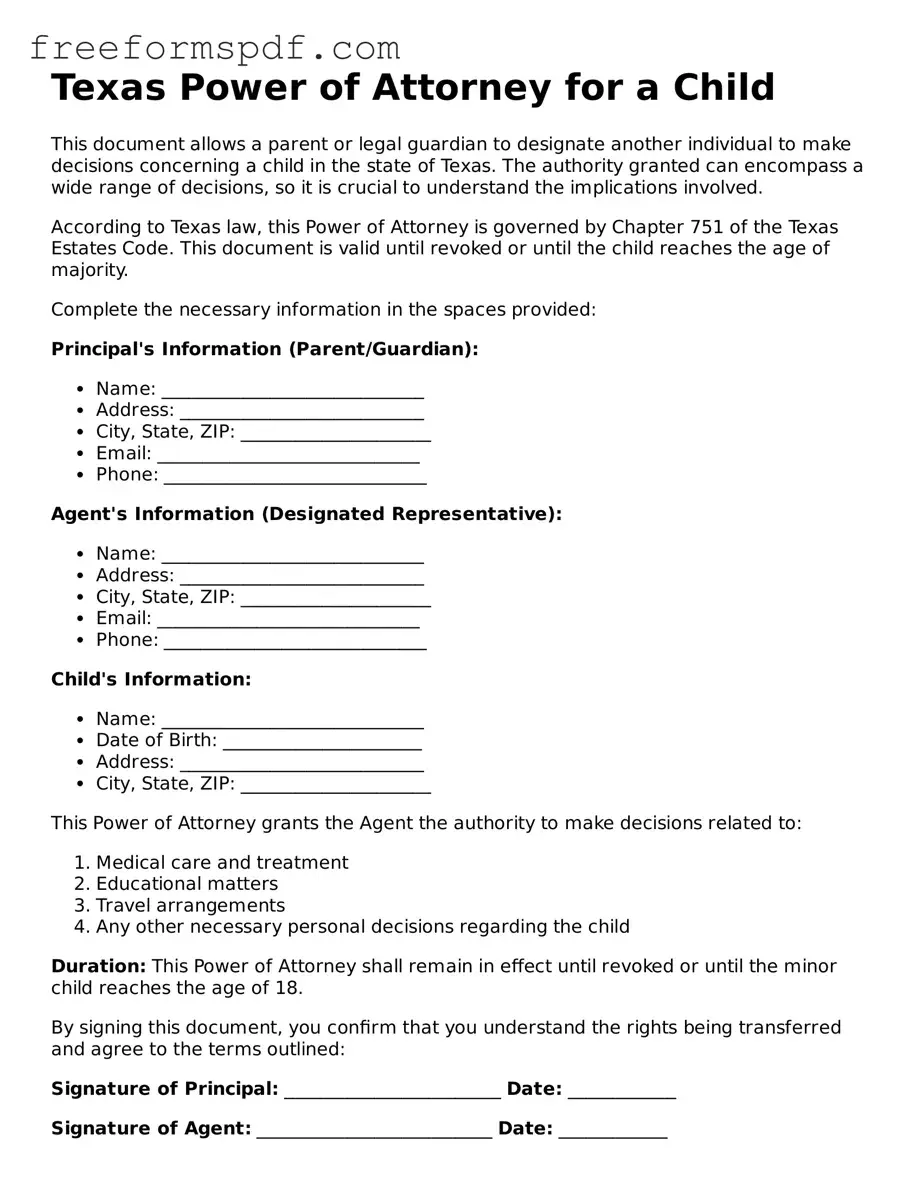Attorney-Verified Power of Attorney for a Child Document for Texas State
Common mistakes
-
Not Specifying the Duration: One common mistake is failing to indicate how long the power of attorney will be in effect. This can lead to confusion about the authority granted.
-
Missing Signatures: Both the parent or guardian and the agent must sign the form. Omitting one of these signatures can invalidate the document.
-
Inaccurate Information: Providing incorrect details about the child or the agent can cause issues. It's crucial to double-check names, addresses, and dates of birth.
-
Not Notarizing the Document: In Texas, the power of attorney for a child must be notarized. Failing to do this step can render the document unenforceable.
Learn More on This Form
-
What is a Texas Power of Attorney for a Child?
The Texas Power of Attorney for a Child is a legal document that allows a parent or legal guardian to designate another adult to make decisions on behalf of their child. This can include decisions related to education, health care, and other day-to-day matters.
-
Why would I need this document?
This document is useful in various situations. For instance, if a parent is traveling or unable to care for their child temporarily, they can grant authority to someone they trust. This ensures that the child’s needs are met without delays.
-
Who can be designated as an agent?
Any adult can be designated as an agent in the Power of Attorney for a Child. This could be a relative, family friend, or anyone the parent trusts to act in the child’s best interest.
-
How long does the Power of Attorney last?
The Power of Attorney can be set for a specific time period or until revoked by the parent. If no end date is specified, it typically remains in effect until the child turns 18 or until the parent revokes it.
-
Does this document allow for medical decisions?
Yes, the Power of Attorney for a Child can include authority for medical decisions. It’s important to specify this in the document if you want the agent to have the ability to make health care decisions for your child.
-
How do I create this Power of Attorney?
To create a Power of Attorney for a Child, you need to fill out the appropriate form. Make sure to include all necessary details, such as the names of the parent, child, and agent. Once completed, it should be signed and dated by the parent in front of a notary public.
-
Can I revoke the Power of Attorney?
Yes, you can revoke the Power of Attorney at any time. To do this, you should provide written notice to the agent and anyone else who may have a copy of the document. This ensures that your wishes are clear and legally binding.
-
Is it necessary to have this document notarized?
Yes, in Texas, the Power of Attorney for a Child must be notarized to be legally valid. This adds an extra layer of authenticity and helps prevent potential disputes regarding the document’s legitimacy.
Misconceptions
The Texas Power of Attorney for a Child form is a crucial document for parents and guardians, yet several misconceptions can lead to confusion and potentially serious consequences. Understanding the facts is essential for making informed decisions regarding your child's care. Below are six common misconceptions about this form:
- It can only be used in emergencies. Many believe that the Power of Attorney for a Child is only applicable in urgent situations. In reality, it can be used for various circumstances, including travel, education, and medical decisions.
- Only parents can create this document. While parents are the most common individuals to use this form, legal guardians and others with custody rights can also establish a Power of Attorney for a Child.
- It automatically expires after a certain period. Some assume that the Power of Attorney for a Child has a fixed expiration date. However, it remains valid until the specified conditions end or it is revoked by the parent or guardian.
- It grants full parental rights to the agent. This form does not transfer all parental rights. Instead, it allows the agent to make specific decisions on behalf of the child, as outlined in the document.
- It can be used in any state without modification. The Texas Power of Attorney for a Child is specific to Texas law. Using it in another state may require adjustments or additional documentation to ensure its validity.
- It's only necessary for long-term arrangements. Some individuals think this form is only for long-term care situations. In fact, it is beneficial for both short-term and long-term arrangements, depending on the needs of the child.
Understanding these misconceptions can empower parents and guardians to utilize the Texas Power of Attorney for a Child form effectively. It is crucial to approach this document with clarity and awareness to ensure the well-being of the child involved.
Some Other Power of Attorney for a Child State Templates
How to Become Power of Attorney for Parent - Defines the scope of authority, which can be tailored to specific needs.
For those looking to streamline their payroll processes in New York, utilizing the NYC Payroll Form along with resources like NY Templates can be extremely beneficial. This document not only keeps employers compliant but also simplifies the reporting of wages for employees engaged in public projects.
Power of Attorney Wa - Grants authority for travel-related decisions for a child’s trip.
Durable Power of Attorney Oregon - This form grants another person legal authority to act on behalf of the child in specific situations.
